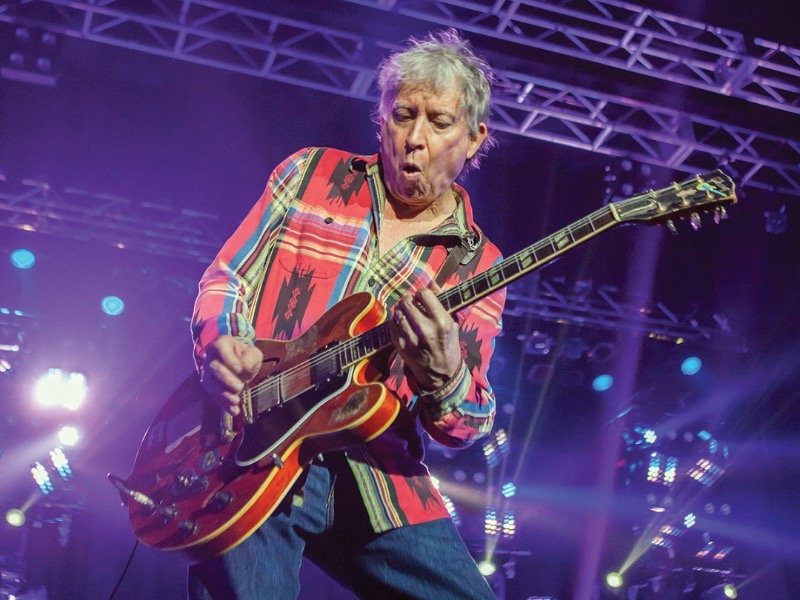"I grew up on a farm in Iowa. Didn’t have electricity or running water. I guess you know that means there was no indoor toilet," said legendary blues-rock guitarist Elvin Bishop in response to a question about his childhood.
"The first time I saw a television was maybe when I was 10 years old. There were no TV stations out where we lived. Remember, I was born in 1942."
It may have been that austere upbringing that helped shape Bishop into a friendly, down to earth guy who has spent his life playing the guitar alongside Jimi Hendrix, John Lee Hooker, Eric Clapton and B.B. King, just to name a few. While in the Paul Butterfield Blues Band in the early 1960s, Bishop and bandmate Mike Bloomfield created the iconic twin lead guitar sound that became a staple of Southern rock a decade later.
In 1976, Bishop released "Fooled Around and Fell in Love," a chart-busting single with Jefferson Starship’s Mickey Thomas on vocals.
Three decades of solo albums followed, a testament to his staying power in a business that changed almost yearly. More recently, Bishop’s 2008 album, "The Blues Roll On," featured guest performances from James Cotton on harmonica and George Thorogood, Warren Haynes and Derek Trucks on guitar. His latest album, "The Big Fun Trio," includes Kim Wilson and Charlie Musselwhite. Somewhere in between it all, he was inducted into the prestigious Rock and Roll Hall of Fame.
Bishop, who will perform at the Wilson Center for the Arts on Friday, Aug. 17, spoke with OnMilwaukee about an extraordinary life spent loving and living the blues.
OnMilwaukee: Talk a little more about growing up. When did your exposure to music occur?
Elvin Bishop: We moved from Iowa to Tulsa, Oklahoma, in the early 1950s, and that’s when I heard music – specifically black music – on the radio. I liked it, and I wanted to hear more. I picked up a cheap guitar in a pawn shop and tried to learn some chords on it. But I didn’t really put a whole lot of effort into it until I started going to school dances and saw how pretty girls went for singers and guitar players! (Laughs)
What made you want to study physics at the University of Chicago?
Actually, I didn’t want to study physics or anything else! (Laughs) We were dirt-poor, you understand, and I was obligated to go because no one else in the family had ever gone to college. My high school grades were good enough to earn a scholarship, and I chose Chicago because it was the gateway to the blues. Oklahoma was segregated back then, and whites and blacks just didn’t mix much. I didn’t attend many classes. I just studied and passed the tests. Things were a little different then.
I met Paul Butterfield and joined his band. Mike Bloomfield and I played our guitars in such a way as to replicate the horn section on the records we loved. That’s where that dual guitar sound came from. I think my folks were a little let down that I didn’t finish college, but they saw I was making a living, and they knew playing music was what I really wanted to do. I was very happy do that. I love to jam with other musicians, and I was thrilled to meet my heroes and the people who inspired me. John Lee Hooker, Albert Collins – just so many of them.
You had said that your vocal limitations made you a better songwriter. Can you elaborate on that?
(Laughs) That’s a nice way of saying it. What I said was that my voice wouldn’t win any prizes and as such, I had to find another way of communicating with people. Not being the best singer meant that I had to write better songs, tell better stories. It’s very important to me to connect with people.
There’s a whole new generation of people who have been exposed to your music since "Fooled Around and Fell In Love" was featured in the movie, "Guardians of the Galaxy."
Yeah, that’s funny, isn’t it? Mickey Thomas, who sang that song, told me his son went and saw the movie, and shouted out, "Hey, that’s my dad!" Luck is a crazy thing, and I’ve had a lot of it in my life.
Some bad luck too. Your daughter was murdered about 20 years ago. How do you deal with something as traumatic as that?
I don’t know exactly. You just try and push on somehow, I guess. I’ve been making music for nearly 60 years, and I’m blessed. Every time I pick up that guitar, something new comes out of it.
You’ve been to Milwaukee many times, especially Summerfest. What can the audience expect from this show?
The set list will have something for everybody. Stuff from the old days, the '60s and '70s. Some good songs from the newer albums. I do everything I can to make ‘em happy. That’s what I love to do.







